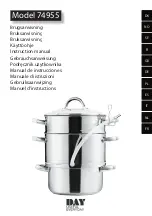
5168274-BIM-I-1121
Johnson Controls Ducted Systems
23
Free cooling is no longer available if the outside air temperature
rises above
either
the Economizer OAT Enable setpoint
or
the
return air temperature.
Single Enthalpy Changeover
For single enthalpy economizer operation, the outside air is
suitable for free cooling if the outside air enthalpy is at least 1
BTU/lb below the Economizer Outside Air Enthalpy Setpoint
and
the outside air temperature is no greater than the RAT plus
9°F.
If the outside air temperature rises above the RAT plus 10°F,
free cooling is no longer available. The outside air temperature
must drop to no greater than RAT plus 9°F to enter free cooling
again.
Free cooling is no longer available if the outside air enthalpy
rises above the Economizer Outside Air Enthalpy Setpoint.
Dual Enthalpy Changeover
For dual enthalpy economizer operation, the outside air
enthalpy must be lower than the return air enthalpy by 1 btu/lb
AND the outside air temperature is no greater than the RAT
plus 9°F.
Auto
The control determines the type of free cooling changeover
based on which sensors are present and reliable. Conditions
include:
• Return and outside air dry bulb = dry bulb changeover
• Return and outside air dry bulb and outside air humidity =
single enthalpy
• Return and outside air dry bulb and return and outside air
humidity = dual enthalpy
• If either the return or outside air dry bulb sensors are
unreliable, free cooling is not available
Free Cooling Operation
When the control determines that the outside air is suitable, the
first stage of cooling will always be free cooling.
Thermostat
In free cooling, with a thermostat input to Y1, the dampers
modulate to control the supply air temperature to the
Economizer Se/- 1°F (default 55°F).
If the thermostat provides an input to Y2
and
the parameter
Compressors Off in Free Cooling is turned OFF a compressor
output energizes. The economizer dampers continue to
modulate to control the supply air temperature to the
Economizer Setpoint.
If the supply air temperature cannot be maintained within 5°F of
the economizer setpoint, the first stage compressor (C1) will be
turned on. Second stage compressor (C2) will be added as
needed to keep the supply air temperature within the 5°F of the
economizer setpoint.
Sensor
In free cooling, with a demand from the zone/return sensor for
the first stage of cooling, the dampers modulate to control the
supply air temperature to the Economizer Se/- 1°F.
If the economizer output is at 100%
and
the SAT is greater than
the Economizer se 1°F, the control starts a 12-minute
timer to energize a compressor output.
If at any time the economizer output drops below 100% the
timer stops and resets when the economizer output returns to
100%.
Once a compressor output is turned ON, the economizer
dampers continue to modulate to control the supply air
temperature to the Economizer Setpoint.
At no time will a compressor output be turned ON if the
economizer output is less than 100%, even if the differential
between zone (or return) temperature and the current cooling
setpoint is great enough to demand more than one stage of
cooling.
If the economizer output goes to minimum position
and
the SAT
is less than Economizer Setpoint -1°F, the control starts a 12-
minute timer to de-energize a compressor output.
If at any time the economizer output goes above the minimum
position the timer stops and resets when the economizer output
returns to minimum position.
If the demand for cooling from the space/return is satisfied, the
economizer output will modulate to minimum position and the
compressor outputs will be de-energized as long as their
minimum run timers have expired.
Power Exhaust
Setpoints
a. Economizer Enable ON
b. Power Exhaust Enable ON
c. Modulating Power Exhaust OFF
d. Exhaust VFD Installed OFF
e. Building Pressure Sensor Enabled OFF
f. Econo Damper Position For Exh Fan ON Percent
g. Econo Damper Position For Exh Fan OFF Percent
Inputs
No inputs are present for non-modulating power exhaust.
Outputs
a. 2-10 VDC from ECON on Economizer Expansion module
















































